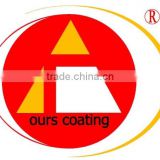Wash and Phosphate Conversion Coating Equipment and systems
USD $1 - $100,000 /Set
Min.Order:1 Set
Quick Details View All >
Yangzhou Ours Machinery Co., Ltd.
Product Details
We offer the latest phosphating equipment lines for metal part or weldments used in various applications including powder coating pre-treatment.
Phosphating or conversion coating is a manufacturing process in which an acidic bath solution reacts with the metal part or weldment and combines with or causes a conversion of the metal part along which is uniform and inert to the environment. Such conversion coating combinations include zinc phosphate, iron phosphate, chromate, or manganese phosphate. Benefits of this process are creation of a surface that is tightly bonded to the base metal, increased surface area, improved corrosion resistance, and better adhesion post processes like the powder coating paint. Phosphating can be performed on ferrous (iron, steel based) and non-ferrous surfaces (zinc, chrome, aluminum, and manganese).
The most common use for phosphating is pretreament of parts before powder coat painting. Powder coat paint is a dry finishing process that uses finely ground particles of color which are electrostatically charged and sprayed onto electrically opposite charged or grounded parts. Naturally opposite charges attract, so the charged powder particles adhere to the part. The parts are typically placed in a curing oven to melt the powder into a uniform colored layer.
The most important stage of powder coating is properly preparing the parts by cleaning residues left from prior processes like welding, grinding, and drawing residues such as machining oils, grease, dust, and rust and then phosphate coating. This is commonly achieved in a multistage alkaline cleaning, rinsing, phosphating, and rinsing immersion tanks or spraying system. Iron phosphate can sometimes combine washing/cleaning with phosphating depending on initial part cleanliness.
Controlling the phosphating process is essential to achieving consistent coatings which ultimately result in a stable powder coating process. The most important process controls in phosphate conversion coating are:
Iron phosphate is the most commonly used pretreatment for powder coating because it can be used with almost any material and has more environmentally friendly bi-products or sludge. This process is commonly used on steel materials.
Zinc phosphate is a non-metallic, crystalline coating that are extremely adherent to materials. It is important to note, zinc phosphate results from the solution itself, not from the part surface like an iron phosphate coating. Zinc phosphate crystals start forming at anodic surfaces on the part surface and stop forming when the part surface area is consumed, ie. they hit another crystal. Unlike the iron phosphate, a zinc phosphate can not clean and coat at the same time: therefore, a four stage- wash, rinse, zinc phosphate, rinse is a common setup. While zinc phosphating provides improved coating adhesion properties, better coating in tight areas and better corrosion resistance, the process has higher operating costs, uses heavy metals, and can produce considerable sludge, none of which are environmentally friendly for disposal purposes. Zinc phosphate is typically used on galvanized steel materials.
Chromium phosphate is most commonly used for aluminum alloy based parts. While this process is effective, like zinc phosphate, it uses heavy metals which need to be recovered for environmentally friendly disposal.
Yangzhou OURS Machinery Co., Ltd. established in year 2006, is an ISO9001 2000 certified company specializing in providing turnkey high-performance, cost-effective powder coating line, liquid painting line, and electrophoresis painting line and equipment solutions with less pollution and better painting quality at affordable price. Products have been sold to more than thirty provinces and cities in China and exported to Russia, Argentina, Venezuela, Iran, Jordan, Ukraine, Bolivia, Germany, Sudan, UK etc.
1) What product do you want to paint? May I have some photos of your product?
2) What’s the material of your product?
3) What’s the maximum workpiece size LxWxH? What’s its maximum weight?
4) How many workpiece do you want to produce in 8 hours?
5) What kind of heating energy do you prefer, such as electricity, diesel, oil, or gas energy?
6) What’s your workshop size LxWxH? May I have a drawing of your workshop?
7) What’s the available industrial and living voltage in your factory?
Contact Supplier

You May Like

New Products
Popular Searches
Recommended Products
Find Similar Products By Category